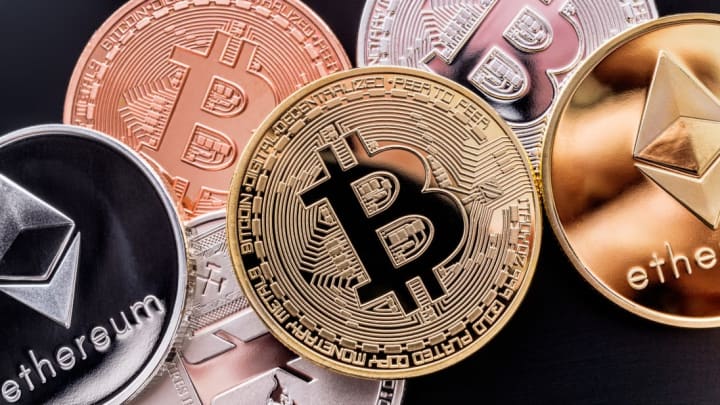In September 2018, the Official Scrabble Players Dictionary added hundreds of new words—one of which was “bitcoin.” Sure, you can get a double letter score for it, but how does cryptocurrency work? And what about the other equally mysterious cryptocurrencies, which have been called everything from the future of money to a pyramid scheme? What is all this fuss about?
THE ISLAND OF YAP
One of the most popular metaphors for how cryptocurrencies work involves the Pacific island of Yap. According to NPR, the residents long ago learned of a distant island with large limestone deposits. The islanders brought back large discs of rock which they eventually turned into a form of currency—not for every day purchases, but for major outlays.
That may sound simple, but it’s not quite that easy. These rocks could weigh as much as a car, so when they changed hands they were rarely actually moved. The society just recognized that “this rock now belongs to person B.”
There’s even a story in which a giant rock brought back to Yap was lost when the boat it was on sank. The islanders dealt with this conundrum by having an oral transaction history, so everyone knew that the rock was not lost. It did have a new owner. In fact, you could argue that they had a kind of public ledger, because everyone knew how many rocks everyone had. Disagreements rarely arose because of the distributed nature of that information. This is akin to one of the most important elements of cryptocurrency: the blockchain.
At its core, the blockchain is just a ledger distributed across a network of computers, which are called nodes. Every time any transaction occurs, the network checks to make sure that it’s a valid transaction and the blockchain gets updated with a new "block," which serves as a permanent record of the transaction. This gets sent to all of the relevant computers—like the Yap islanders telling everyone about the change of ownership of a rock. The block is added to the blockchain alongside a code called a hash.
SECURITY
The hash is essentially a digital fingerprint generated by complex mathematics. This is part of the system’s security, as it takes time and energy to generate these hashes. As Reuters explains, any change to the input creates a new hash. By way of example, they explained that the extremely long novel War and Peace might have a hash like:
a948904f2f0f479b8f8197694b30184b0d2ed1c1cd2a1ec0fb85d299a192a447
While just deleting one comma from the text changes it to:
40115cc2aecc43ea86a7e54be6f7257abff7b43959cd728f06c0c7423039166r
By itself, this is not necessarily secure. But every new block also contains the previous hash as a kind of error check. If someone goes in to retroactively change a transaction (say, by deleting that comma in War and Peace), that block's hash gets updated to a new code. But the next block will have a different hash code on record from the previous block (it will be looking for the old hash, the one beginning with a948—but seeing the new hash, the one starting with 4011), so in theory the nefarious action will be discovered. There are potential ways to cheat this system. A computer faster than the other nodes combined may be able to rewrite blocks fast enough to work, but MIT Technology Review cautioned that even then “success isn’t guaranteed.”
CRYPTOCURRENCY
But cryptocurrencies and blockchains are not synonymous. Similarly to how the internet and world wide web are not synonymous, blockchain is a technology chiefly used for cryptocurrencies, though this may not always be the case. It’s increasingly being examined for use in other fields—and some even argue cryptocurrency is one of the least promising fields.
The crypto in cryptocurrency is a reference to the cryptography used to ensure that the transactions are secure. Up until this stage, it’s not particularly different from any other digital currency—when you send U.S. dollars over the internet, physical dollars are not changing hands. That’s true for any digital currency, of which cryptocurrencies are one.
But there are key differences—including that, traditionally, money is issued by the government or some powerful institution. Cryptocurrencies are created by algorithms. Another important distinction is how ownership is traced. Because there’s nothing physical to a cryptocurrency, the blockchain ledger is used to determine ownership.
There are also more nuanced differences. Because the blockchain ledger has to be transparent, all transactions are public, leading to many suggestions for how to best manage privacy expectations. As another distinction, many cryptocurrencies are limited to a set number—only 21 million bitcoins will ever exist, and it remains unclear what will happen when the final bitcoin is "mined." Contrast that with traditional currency, which can be produced in limitless quantities.
Not everyone is convinced that cryptocurrencies are the future. Speaking to Vox, Nicholas Weaver of the International Computer Science Institute at UC Berkeley explained that miners—the people who create the blocks and get paid for their efforts—are disproportionately powerful and serve as the central agency that cryptocurrencies are trying to avoid. Also, he argues that outside of nefarious purchases (like assassins or illegal drugs), there isn’t a point to cryptocurrencies. Due to price volatility, they don’t fundamentally work as a currency. There’s a famous story about a programmer buying two pizzas for 10,000 bitcoin—a sum that would be worth more than $80 million just a few years later. This volatility, according to Weaver, means that most companies claiming they accept bitcoin aren’t actually accepting bitcoin per se, they just instantly sell it for conventional currency.
Cryptocurrency fans immediately pounced on these comments, arguing that it’s an oversimplification and could be used to argue against other forms of currency as well. No matter what, the debates will continue.
Have you got a Big Question you'd like us to answer? If so, let us know by emailing us at bigquestions@mentalfloss.com.
